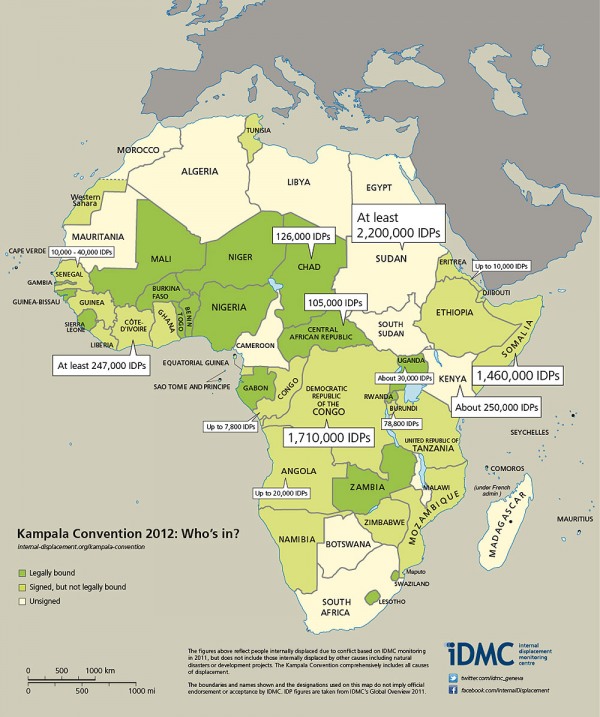On 6 December, Nigeria celebrated!
In the first-floor auditorium of the National Human Rights Commission, participants’ pride became evident through the spontaneous rounds of applause that filled the room in reaction to some of the milestones that marked the path to the KC becoming legally binding. Nigeria and seven other West African countries represent more than half of the 15 states that have shaped this important day for internally displaced people living in Africa.

*NB: This map was updated March 20th, 2013 to reflect new ratifications since December. The figures here are for conflict-induced IDPs only and do not include those from natural disasters or development projects.
Sober in the face of daunting responsibilities, Nigerians outline the steps towards making the convention a concrete reality
Nigeria, which was the 12th country to ratify the convention in 2012, is one of the states committed to lead in the advocacy, promotion, domestication and implementation of the convention and to reconsidering old policies on IDPs.
- A new policy for IDPs. At yesterday’s event, an articulate Nigerian Professor of law demystified the meaning of Nigeria’s new international obligations, explaining how they must now be reflected or “domesticated” in Nigerian law. There was consensus among civil society and governmental actors that they need to unite their efforts for the speedy development of new legislation and the adoption of a proposed IDP policy, in accordance with Nigeria’s obligations under the KC. If stakeholders take a common front to advocate for the quick passage of this, this would be the first policy adopted that reflects the provisions and spirit of the Kampala Convention.
- Improved response for the growing numbers of IDPs. The challenges and shortcomings of national response to internal displacement in Nigeria were at the forefront of IDP stakeholders’ minds. The incidences of violence causing people to flee inside the country seem to be disrupting lives regularly. Estimates of people displaced range from about half a million to over one million. As little as a few months ago, 2.1 million people were displaced by floods – the worst seen in five decades. The challenges ahead include improving disaster preparedness, data collection, coordination and delivery of assistance and protection measures to address the risks that arise from forced displacement like the separation of families, sexual and gender based violence, and human trafficking.
- Better coordination needed. The KC requires states to designate an authority responsible for the overall coordination of IDP activities. This may seem like a legalistic or technical requirement, but gaps and uncertainties around who is responsible for doing what for IDPs prove to be serious obstacles to effective responses to internal displacement in Nigeria and in many countries worldwide. At this commemorative event, there was consensus that government agencies must get better at collaborating and coordinating their actions around IDPs – this is significant progress made as a result of the discussions that happened over the last year. Designating a coordinating body in line with provisions in the KC is an essential next step.
While there are no doubt challenges, what was exciting for me was to see how the entry into force of the KC last week provided a sense of momentum and pride, perhaps key ingredients needed to turn those challenges into opportunities.
For more info, visit IDMCs Kampala Convention webpage
See IDMC’s recent blog post about the concrete impact of the Kampala Convention on the rights of internally displaced people (IDPs)
Don’t miss our audio message on the Kampala Convention and our video, in English and French, below and at http://www.youtube.com/idmctube
Finally, visit our website for more information and to download our guide for civil society organizations.
